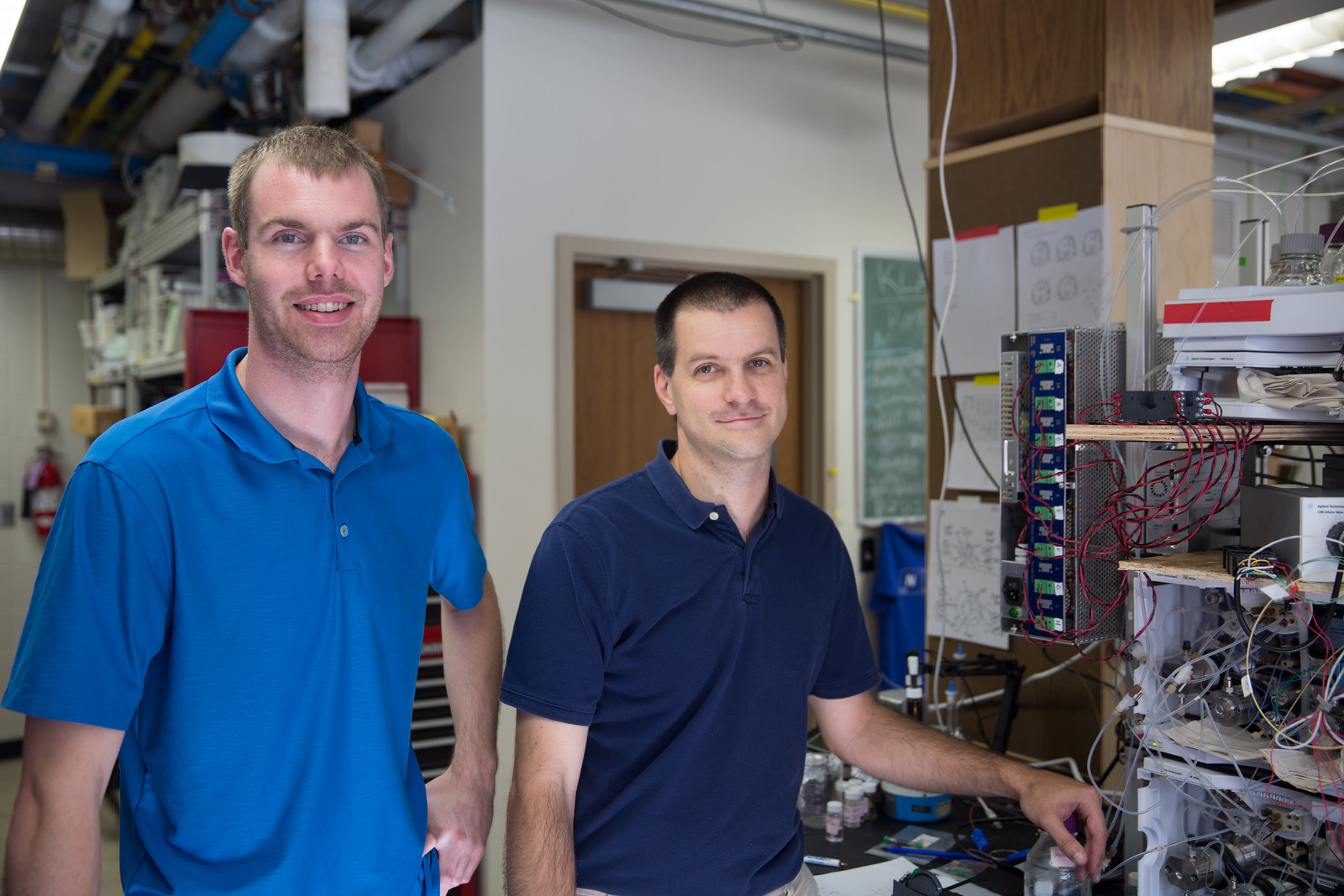“I wasn’t anything out of the ordinary as a first-year student,” Gustavus Adolphus College alumnus Steve Groskreutz ’12 said during a visit to campus in late August. He was in Saint Peter to install new equipment in chemistry professor Dwight Stoll’s lab, where Groskreutz first learned about high-performance liquid chromatography and cut his teeth as an undergrad researcher.
A Faribault, Minn. native, Groskreutz is on track to finish his doctorate in analytical chemistry at the University of Pittsburgh this December. The next adventure? An 18-month postdoctoral fellowship at The Free University of Brussels in Belgium.
Looking back, he attributes much of his success to a lucky class placement as a new Gustavus student.
“I only met Dwight because of a registration coincidence my first semester,” Groskreutz recalled. “We got to know each other throughout the course of the lab and he kind of took me under his wing.” Now, nearly a decade later, Groskreutz has been published nearly a dozen times and presents regularly at national and international academic conferences.

“Right from the start it was clear that Steve had a combination of qualities we don’t see in too many students as first-years. His great work ethic, ability to focus, and persistent curiosity are all traits that enable success in research,” Stoll said. “He was willing to work on any aspect of an experiment, and always thinking about next steps in the project based on the outcomes of initial experiments.”
The two conducted research together that first January Interim Experience, then for the next two summers (including one as a Gustavus First-Year Research Experience student). But as Groskreutz prepared for the break between his junior and senior year, Stoll suggested something different.
After the professor made a few calls and Groskreutz explored his options, he ended up with a research internship at the University of Pittsburgh. During the internship, Groskreutz made connections that would directly lead to his doctoral placement at Pitt with graduate adviser professor Stephen Weber.
“I was one of the best prepared students in the analytical chemistry division when I started my graduate program,” Groskreutz said. “I don’t think you realize how good you really are until you leave Gustavus because the quality of the students and faculty here is so exceptional.”
During his time at Pitt, one of the highlights of Groskreutz’s experience was the opportunity to attend the Lindau Meeting of Nobel Laureates. He was one of about 50 Americans selected for the conference in southern Germany, which connects 600 young scientists from across the globe with 70 Nobel laureates for lectures, discussion sessions, panels, and networking. The Lindau Meeting provides an intimate and informal environment for the next generation of scientists – including Groskreutz – to connect with the world’s most renowned experts.
“I was incredibly honored to be selected to attend the Lindau Meeting,” said Groskreutz, who joined other American scientists from institutions like MIT, Stanford, CalTech, and the University of Chicago for the experience. “Overall, it was a great experience to interact with the Nobel laureates, but what I enjoyed most was getting to know the other top young scientists from such diverse scientific backgrounds.”
Despite his growing connections and increasing reputation in the field of liquid chromatography, Groskreutz considers his collaborations with Stoll to be some of his most valuable work. “When I go out and talk to people in industry and academia, I’m more well-known for things I’ve done with Dwight than most of what I’ve done since,” Groskreutz said. “We still talk a few times a week and often share emails and research papers. I consider him a friend as well as a mentor.”
“It’s been fun to watch Steve develop professionally and intellectually. In the early days I told him which equations and concepts were important, and how to use them. Now, he’s coming back to me sharing things he’s found important in the literature, as well as his own ideas for experiments and projects he has been thinking about,” Stoll said. “It is exciting to think about where he will ultimately take his skills – the scientific community needs leaders like Steve that are both smart and conscientious.”
“I wouldn’t change a thing about my experience,” Groskreutz added. “There’s a little bit of chance and a whole lot of effort and dedication that go into being successful.”
As he finished installing equipment in the lab where it all began and prepared to return to Pitt for his last semester, Groskreutz reflected on his time at Gustavus.
“It’s home,” he said. “It’s where I came from and I’m proud of that.”
High-performance liquid chromatography is an analytical chemistry technique that allows researchers to separate, identify, and quantify components in a liquid mixture. It has applications in pharmaceutical development, blood and urine testing, drug analysis, and chemical research.

Leave a Reply
You must be logged in to post a comment.